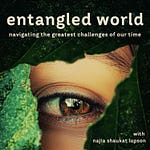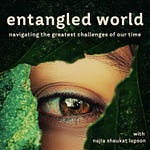Watch on YouTube.
Today I had the pleasure of speaking with Dr. Elizabeth Sawin, Director of the Multisolving Institute, which she founded in 2021 to develop tools and share research on "multisolving." This innovative approach addresses equity, climate change, health, well-being, and economic vitality as interconnected issues, helping to create solutions that tackle multiple problems simultaneously. Elizabeth developed this concept after studying successful "bright spots" around the world—places where people brought about systems change by breaking down silos and building connections.
Elizabeth’s background is rooted in system dynamics and computer simulation, a field in which she was mentored by the renowned Donella Meadows at the Sustainability Institute. She has a forthcoming book titled Multisolving: Creating Systems Change in a Fractured World. It’s an inspiring and practical guide that I highly recommend to anyone interested in systems change work.
In our conversation, we explore Elizabeth’s groundbreaking work in multisolving, where she shares real-world examples of how this approach works in practice—such as bringing together asthma advocates and environmentalists to craft holistic solutions for communities. These collaborative efforts not only address environmental concerns but also improve public health and community resilience, highlighting the power of integrated action.
We also dive into the essential worldview shift that Elizabeth believes is necessary for meaningful change. The dominant worldview, particularly in the Western world, treats the world as a "collection of objects," where safety comes from domination, power is gained through control, and causality is viewed as linear. In contrast, the relational worldview, often associated with indigenous traditions, sees the world as a web of interconnected relationships. In this worldview, safety comes from partnership, power is built through consent, and boundaries are fluid and permeable. Elizabeth emphasizes that to transform the physical world, we must first transform our mental models, learning to recognize and act within this web of relationships.
One of the most thought-provoking aspects of our discussion is the idea of fractals—how patterns that repeat in nature also appear in societal structures. Elizabeth explains how the "collection of objects" worldview manifests fractally in systems like supremacy, patriarchy, colonialism, and extractive economics. Conversely, the relational worldview gives rise to fractals of rights for nature, gender and racial equity, and sustainable economies. These patterns reinforce each other, so our work involves breaking harmful patterns and forging new relationships through which healthier, more sustainable fractals can emerge.
Entangled World is 100% independent and will never take advertiser money. If you value it, and have the means, please consider subscribing on Patreon.









Share this post